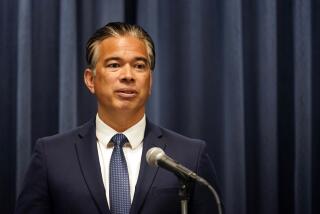String of Illegal Home-Sewing Sites Found, Regulators Say
- Share via
Raising serious doubts about the effectiveness of a government program to combat sweatshops, state inspectors have uncovered a string of what they say are illegal home-sewing operations in Los Angeles and the San Gabriel Valley.
The state investigators, in a series of raids over the last two days, found eight homes where workers were allegedly producing clothing illegally for contractors of Guess Inc. and other apparel manufacturers.
The connection to Guess, the Southland’s biggest garment-manufacturing company, was troubling to industry observers because the business has been lauded in recent years for its supposed efforts to clean up the abuse-ridden garment industry.
Under pressure from authorities in 1992, Guess signed a landmark agreement with the federal government promising to police the workplace practices of its contractors. The self-regulatory pact led to a series of similar agreements between the federal government and other major apparel firms.
Guess is one of more than 30 garment manufacturers or retailers put on the federal government’s Trendsetter, or “good guy,” list for its efforts to avoid doing business with sweatshops. The list was established after the garment industry suffered a national black eye last year when 72 Thai workers were found toiling in what government officials called slave-like conditions in an illegal El Monte sewing factory.
U.S. Labor Secretary Robert B. Reich said Tuesday that this week’s raids of homes do not reflect poorly on federal efforts to fight sweatshops or give the lie to the Trendsetter list.
“We knew inevitably that there might be some members of the industry who might promise to clean up their act and be unable to follow through,” Reich said in a telephone interview. “But that doesn’t mean we should stop trying or the industry should stop making efforts.”
If investigators conclude that Guess failed to live up to its promises, it could be removed from the Trendsetters list, he added.
On Tuesday, a Guess spokeswoman said the company has been complying with federal regulations. Moreover, she said, over the last three years the company has terminated contracts with 15 contractors after finding labor law violations.
But David Young, the Western states organizing director for UNITE, the Union of Needletrades, Industrial and Textile Employees, which is the main garment industry union, reacted angrily. Young said the company has presented itself as a prime example “of compliance and proper treatment of their workers. . . . This shows that it’s false and that it’s hypocrisy.”
UNITE, which represents few workers in Southern California but which has been looking for ways to recruit members in the area, triggered the state investigation by turning over information on home work sites to authorities. Young declined to comment on whether UNITE would seek to organize workers at Guess or at its network of sewing contractors.
State investigators, armed with court-issued search warrants, began raiding homes scattered throughout Rosemead and other nearby San Gabriel Valley communities early Monday evening. Later they investigated sites in and near downtown Los Angeles.
By Tuesday afternoon, they checked 11 homes and found garments being sewn for Guess at eight of them, regulators said. A variety of other manufacturers’ goods were also found, but the Guess merchandise was the most common, they said.
Although investigators simply confiscated the goods and did not issue any citations against the home workers, they said they will seek penalties against the string of contractors employing them. State authorities say they expect to cite as many as five Guess contractors for violations relating to minimum-wage and overtime pay and other issues.
Investigators said they found no evidence of child labor at the allegedly illegal operations uncovered this week.
More to Read
Inside the business of entertainment
The Wide Shot brings you news, analysis and insights on everything from streaming wars to production — and what it all means for the future.
You may occasionally receive promotional content from the Los Angeles Times.










